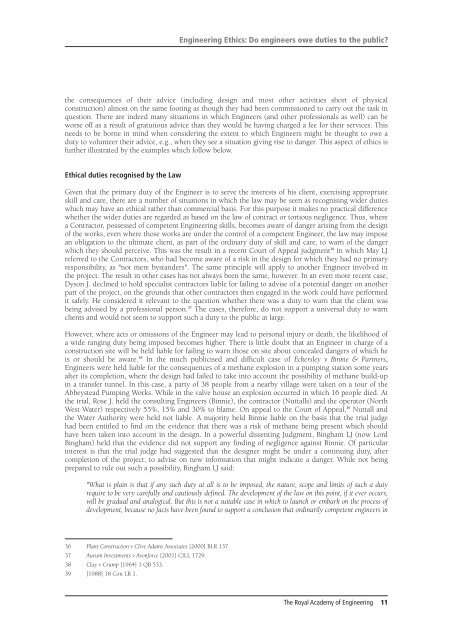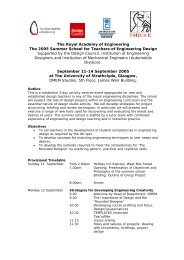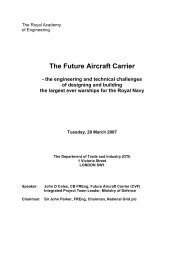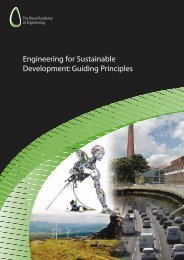Engineering Ethics: Do engineers owe duties to the
Engineering Ethics: Do engineers owe duties to the
Engineering Ethics: Do engineers owe duties to the
Create successful ePaper yourself
Turn your PDF publications into a flip-book with our unique Google optimized e-Paper software.
<strong>Engineering</strong> <strong>Ethics</strong>: <strong>Do</strong> <strong>engineers</strong> <strong>owe</strong> <strong>duties</strong> <strong>to</strong> <strong>the</strong> public?<br />
<strong>the</strong> consequences of <strong>the</strong>ir advice (including design and most o<strong>the</strong>r activities short of physical<br />
construction) almost on <strong>the</strong> same footing as though <strong>the</strong>y had been commissioned <strong>to</strong> carry out <strong>the</strong> task in<br />
question. There are indeed many situations in which Engineers (and o<strong>the</strong>r professionals as well) can be<br />
worse off as a result of gratui<strong>to</strong>us advice than <strong>the</strong>y would be having charged a fee for <strong>the</strong>ir services. This<br />
needs <strong>to</strong> be borne in mind when considering <strong>the</strong> extent <strong>to</strong> which Engineers might be thought <strong>to</strong> <strong>owe</strong> a<br />
duty <strong>to</strong> volunteer <strong>the</strong>ir advice, e.g., when <strong>the</strong>y see a situation giving rise <strong>to</strong> danger. This aspect of ethics is<br />
fur<strong>the</strong>r illustrated by <strong>the</strong> examples which follow below.<br />
Ethical <strong>duties</strong> recognised by <strong>the</strong> Law<br />
Given that <strong>the</strong> primary duty of <strong>the</strong> Engineer is <strong>to</strong> serve <strong>the</strong> interests of his client, exercising appropriate<br />
skill and care, <strong>the</strong>re are a number of situations in which <strong>the</strong> law may be seen as recognising wider <strong>duties</strong><br />
which may have an ethical ra<strong>the</strong>r than commercial basis. For this purpose it makes no practical difference<br />
whe<strong>the</strong>r <strong>the</strong> wider <strong>duties</strong> are regarded as based on <strong>the</strong> law of contract or <strong>to</strong>rtious negligence. Thus, where<br />
a Contrac<strong>to</strong>r, possessed of competent <strong>Engineering</strong> skills, becomes aware of danger arising from <strong>the</strong> design<br />
of <strong>the</strong> works, even where those works are under <strong>the</strong> control of a competent Engineer, <strong>the</strong> law may impose<br />
an obligation <strong>to</strong> <strong>the</strong> ultimate client, as part of <strong>the</strong> ordinary duty of skill and care, <strong>to</strong> warn of <strong>the</strong> danger<br />
which <strong>the</strong>y should perceive. This was <strong>the</strong> result in a recent Court of Appeal judgment 36 in which May LJ<br />
referred <strong>to</strong> <strong>the</strong> Contrac<strong>to</strong>rs, who had become aware of a risk in <strong>the</strong> design for which <strong>the</strong>y had no primary<br />
responsibility, as "not mere bystanders". The same principle will apply <strong>to</strong> ano<strong>the</strong>r Engineer involved in<br />
<strong>the</strong> project. The result in o<strong>the</strong>r cases has not always been <strong>the</strong> same, h<strong>owe</strong>ver. In an even more recent case,<br />
Dyson J. declined <strong>to</strong> hold specialist contrac<strong>to</strong>rs liable for failing <strong>to</strong> advise of a potential danger on ano<strong>the</strong>r<br />
part of <strong>the</strong> project, on <strong>the</strong> grounds that o<strong>the</strong>r contrac<strong>to</strong>rs <strong>the</strong>n engaged in <strong>the</strong> work could have performed<br />
it safely. He considered it relevant <strong>to</strong> <strong>the</strong> question whe<strong>the</strong>r <strong>the</strong>re was a duty <strong>to</strong> warn that <strong>the</strong> client was<br />
being advised by a professional person. 37 The cases, <strong>the</strong>refore, do not support a universal duty <strong>to</strong> warn<br />
clients and would not seem <strong>to</strong> support such a duty <strong>to</strong> <strong>the</strong> public at large.<br />
H<strong>owe</strong>ver, where acts or omissions of <strong>the</strong> Engineer may lead <strong>to</strong> personal injury or death, <strong>the</strong> likelihood of<br />
a wide ranging duty being imposed becomes higher. There is little doubt that an Engineer in charge of a<br />
construction site will be held liable for failing <strong>to</strong> warn those on site about concealed dangers of which he<br />
is or should be aware. 38 In <strong>the</strong> much publicised and difficult case of Eckersley v Binnie & Partners,<br />
Engineers were held liable for <strong>the</strong> consequences of a methane explosion in a pumping station some years<br />
after its completion, where <strong>the</strong> design had failed <strong>to</strong> take in<strong>to</strong> account <strong>the</strong> possibility of methane build-up<br />
in a transfer tunnel. In this case, a party of 38 people from a nearby village were taken on a <strong>to</strong>ur of <strong>the</strong><br />
Abbeystead Pumping Works. While in <strong>the</strong> valve house an explosion occurred in which 16 people died. At<br />
<strong>the</strong> trial, Rose J. held <strong>the</strong> consulting Engineers (Binnie), <strong>the</strong> contrac<strong>to</strong>r (Nuttalls) and <strong>the</strong> opera<strong>to</strong>r (North<br />
West Water) respectively 55%, 15% and 30% <strong>to</strong> blame. On appeal <strong>to</strong> <strong>the</strong> Court of Appeal, 39 Nuttall and<br />
<strong>the</strong> Water Authority were held not liable. A majority held Binnie liable on <strong>the</strong> basis that <strong>the</strong> trial judge<br />
had been entitled <strong>to</strong> find on <strong>the</strong> evidence that <strong>the</strong>re was a risk of methane being present which should<br />
have been taken in<strong>to</strong> account in <strong>the</strong> design. In a p<strong>owe</strong>rful dissenting Judgment, Bingham LJ (now Lord<br />
Bingham) held that <strong>the</strong> evidence did not support any finding of negligence against Binnie. Of particular<br />
interest is that <strong>the</strong> trial judge had suggested that <strong>the</strong> designer might be under a continuing duty, after<br />
completion of <strong>the</strong> project, <strong>to</strong> advise on new information that might indicate a danger. While not being<br />
prepared <strong>to</strong> rule out such a possibility, Bingham LJ said:<br />
"What is plain is that if any such duty at all is <strong>to</strong> be imposed, <strong>the</strong> nature, scope and limits of such a duty<br />
require <strong>to</strong> be very carefully and cautiously defined. The development of <strong>the</strong> law on this point, if it ever occurs,<br />
will be gradual and analogical. But this is not a suitable case in which <strong>to</strong> launch or embark on <strong>the</strong> process of<br />
development, because no facts have been found <strong>to</strong> support a conclusion that ordinarily competent <strong>engineers</strong> in<br />
36 Plant Construction v Clive Adams Associates [2000] BLR 137.<br />
37 Aurum Investments v Avonforce [2001] CILL 1729.<br />
38 Clay v Crump [1964] 1 QB 533.<br />
39 [1988] 18 Con LR 1.<br />
The Royal Academy of <strong>Engineering</strong> 11

















